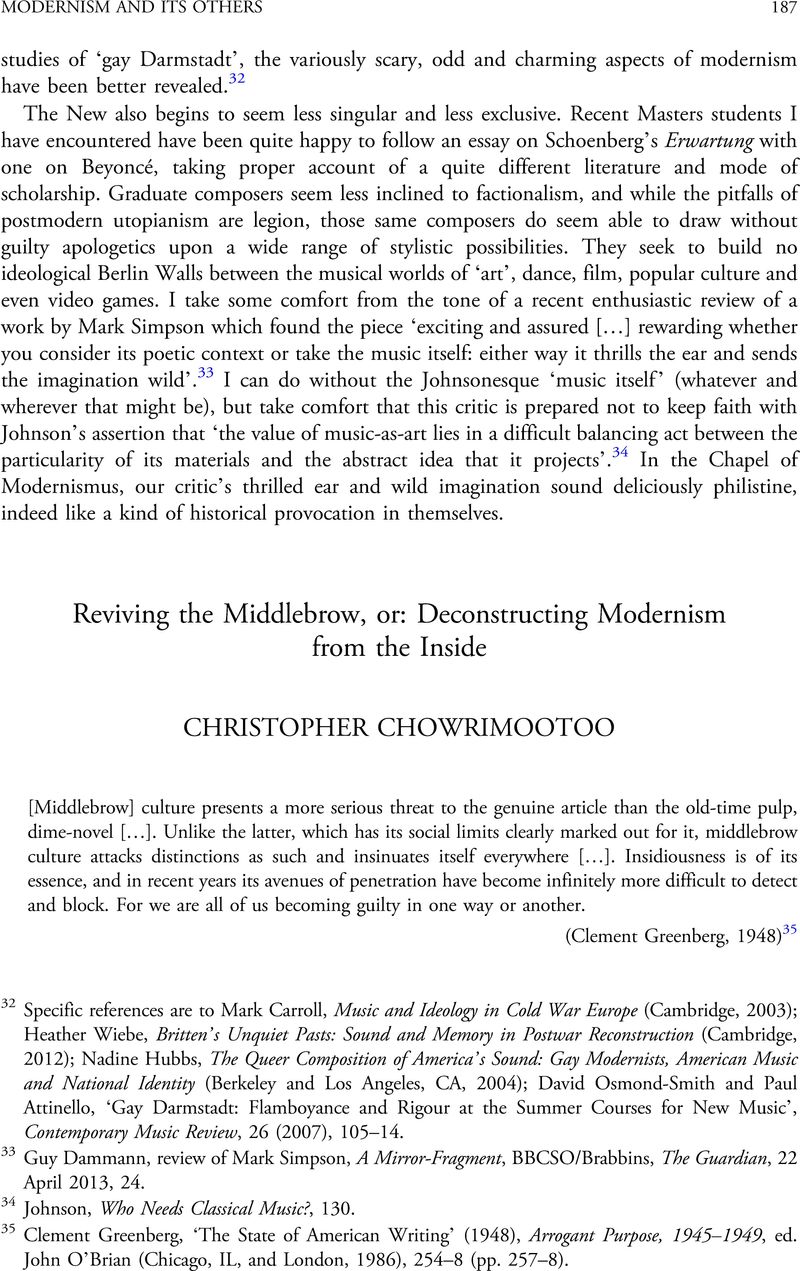Published online by Cambridge University Press: 01 January 2020

35 Clement Greenberg, ‘The State of American Writing’ (1948), Arrogant Purpose, 1945–1949, ed. John O'Brian (Chicago, IL, and London, 1986), 254–8 (pp. 257–8).
36 The term ‘great divide’ was coined by the literary critic Andreas Huyssen (After the Great Divide: Modernism, Mass Culture, Postmodernism (Bloomington, IN, 1986)).
37 Arnold Schoenberg, ‘Foreword to Three Satires for Mixed Chorus, op. 28’ (1925–6), A Schoenberg Reader, ed. Joseph Auner (New Haven, CT, 2003), 186–7 (p. 186).
38 McClary, ‘Terminal Prestige’; Peter Franklin, The Idea of Music: Schoenberg and Others (London, 1985).
39 Some of the most prominent examples of this sort of historiographical revisionism include James Hepokoski, ‘Fiery-Pulsed Libertine or Domestic Hero? Strauss's Don Juan Reinvestigated’, Richard Strauss: New Perspectives on the Composer and his Works, ed. Bryan Gilliam (Durham, NC, 1992), 135–75; idem, Sibelius: Symphony No. 5 (Cambridge, 1993); and J. P. E. Harper-Scott, Edward Elgar, Modernist (Cambridge, 2006).
40 For an elaboration of this point, see my discussion of Richard Taruskin's Britten chapter in The Oxford History of Western Music, v, chapter 64: ‘Standoff (I)’, 221–59, in Christopher Chowrimootoo, ‘Bourgeois Opera: Death in Venice and the Aesthetics of Sublimation’, Cambridge Opera Journal, 22 (2010), 175–216 (pp. 211–12).
41 Brigid Cohen, Stefan Wolpe and the Avant-Garde Diaspora (Cambridge, 2012), 8–12; Miriam Hansen, ‘The Mass Production of the Senses: Classical Cinema as Vernacular Modernism’, Modernism/Modernity, 6/2 (April 1999), 59–77.
42 Brigid Cohen, Stefan Wolpe and the Avant-Garde Diaspora (Cambridge, 2012), 8–12; Miriam Hansen, ‘The Mass Production of the Senses: Classical Cinema as Vernacular Modernism’, Modernism/Modernity, 6/2 (April 1999), 60.
43 Cohen, Stefan Wolpe and the Avant-Garde Diaspora, 2.
44 For an important milestone in the theorization of ‘modernisms’ in the plural, see Peter Nicholls, Modernisms: A Literary Guide (Berkeley and Los Angeles, CA, 1995).
45 Björn Heile offers a similar warning about alternative modernisms, albeit from quite a different perspective, in a recent review article (‘Musical Modernism, Sanitized’, Modernism/Modernity, 18/3 (September 2011), 631–7).
46 Cohen, Stefan Wolpe and the Avant-Garde Diaspora, 9.
47 Constant Lambert, Music Ho! A Study of Music in Decline (3rd edn, London, 1948).
48 Theodor W. Adorno, The Philosophy of New Music, trans. Robert Hullot-Kentor (Minneapolis, MN, 2006), 9.
49 J. B. Priestley, ‘High, Low, Broad’, Open House: A Book of Essays (London, 1926), 162–7 (p. 166).
50 Adorno, The Philosophy of New Music, trans. Hullot-Kentor, 10.
51 James Gilbert, ‘Midcult, Middlebrow, Middle Class’, American History, 20 (1992), 543–8 (p. 543).
52 Joan Shelley Rubin, The Making of Middlebrow Culture (Chapel Hill, NC, 1992).
53 Nicola Humble, The Feminine Middlebrow Novel, 1920s to 1950s: Class, Domesticity and Bohemianism (New York and Oxford, 2001), 11–12.
54 See Sabine Feisst, ‘Schoenberg Reception in America, 1933–51’, The Cambridge Companion to Schoenberg, ed. Jennifer Shaw and Joseph Auner (Cambridge, 2010), 247–57, and eadem, Schoenberg's New World: The American Years (New York and Oxford, 2011).
55 Feisst, ‘Schoenberg Reception in America’, 247–8, 256–7.
56 For an examination of this problem in the critical and scholarly reception of Benjamin Britten's Albert Herring (1947), see Christopher Chowrimootoo, ‘The Timely Traditions of Albert Herring’, Opera Quarterly, 27 (2011), 379–419.
57 In recent years, a number of literary scholars have started to explore the middlebrow's sprawling aesthetic boundaries, focusing particularly on its overlap with modernism. See, for example, Daniel Tracy, ‘Middlebrow Modernism: Professional Writing, Genre, and the Circulation of Cultural Authority in US Mass Culture, 1913–1932’ (Ph.D. dissertation, University of Illinois at Urbana-Champaign, 2008). See also a recent issue of Modernist Cultures devoted to the relationship between modernism and the middlebrow: The Middlebrow – Within or Without Modernism, ed. Melissa Sullivan and Sophie Blanch, Modernist Cultures, 6/1 (special issue, 2011).
58 In ‘Proclaiming the Mainstream: Schoenberg, Berg and Webern’, The Cambridge History of Twentieth-Century Music, ed. Nicholas Cook and Anthony Pople (Cambridge, 2005), 228–59, Joseph Auner points towards ways in which these often overlooked questions could be addressed.